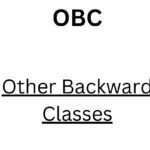OBC stands for “Other Backward Classes.” In the context of India, OBC refers to a category of socially and educationally disadvantaged groups who are provided certain reservations and benefits in areas like education and public employment to promote their socio-economic upliftment and ensure equal opportunities.
OBCs are identified based on government lists and criteria, and their inclusion aims to address historical disadvantages and create a more inclusive and equitable society.
About
OBC stands for Other Backward Classes. It is a social group in India that is considered to be educationally and socially disadvantaged. OBCs are eligible for reservation benefits in education and government jobs.



The term “Other Backward Classes” was first used in the Mandal Commission Report of 1980. The Mandal Commission was appointed by the Government of India to study the social, educational, and economic conditions of the socially and educationally backward classes in India. The Commission found that a large number of people in India belonged to these classes, and that they were facing discrimination in education and employment.
The Mandal Commission recommended that 27% of all government jobs and seats in educational institutions be reserved for OBCs. This recommendation was implemented by the government in 1990.
OBCs are a diverse group, and they include people from a variety of castes and communities. Some of the largest OBC communities in India include Jats, Marathas, Kurmis, Yadavs, and Vaishyas.
OBCs play an important role in the economy and society of India. They are a large and growing group, and they are increasingly demanding their share of opportunities.
The reservation benefits for OBCs have been controversial. Some people argue that the benefits are necessary to help OBCs overcome the disadvantages they face. Others argue that the benefits are unfair to other groups, such as the Scheduled Castes and Scheduled Tribes.
The debate over OBC reservations is likely to continue for many years to come. However, there is no doubt that OBCs are a significant and growing group in India, and that they will continue to play an important role in the country’s economy and society.
Which castes are included in the OBC?
The castes included in the OBC category vary from state to state. The central government has a list of over 2,650 communities that are considered to be OBCs, but this list is not exhaustive. States and union territories can add their own communities to the list, and they can also remove communities from the list.
Here are some of the most common castes that are included in the OBC category:
- Jats
- Kurmis
- Yadavs
- Gujars
- Lodhis
- Rajputs
- Kunbis
- Ahirs
- Kurubara
These are just a few examples, and there are many other castes that are included in the OBC category. The specific castes that are included in the OBC category in a particular state or union territory can be found by checking the government’s website.
OBC Reservation
Educational Institutions:
| Category | Reservation Percentage |
|---|---|
| Central Educational Institutions (excluding minority institutions) | 27% |
| State Educational Institutions and Universities | Varies by State |
Government Jobs:
Category | Reservation Percentage |
|---|---|
| Central Government Jobs | 27% |
| State Government Jobs | Varies by State |
Frequently Asked Question
OBC stands for Other Backward Classes.
Seats reserved in educational institutions and government jobs. Financial assistance for education and training. Preference in government contracts and subsidies.
The OBC reservation in India is 27%. This means that 27% of all government jobs and seats in educational institutions are reserved for people who belong to the OBC category.
Conclusion
Finally, OBC is an abbreviation for “Other Backward Classes.” In India, OBC refers to a group that is socially and educationally disadvantaged. The word refers to many castes and communities that have historically endured discrimination and marginalisation. To encourage social economic upliftment and equal chances, the Indian government has enacted reservation regulations for OBCs in education and public employment. These reservation laws seek to promote a more inclusive and equitable society by increasing access to educational opportunities and improving representation in government employment for OBC populations. The OBC reservation is critical in resolving historical inequities and creating a more just and inclusive society.






